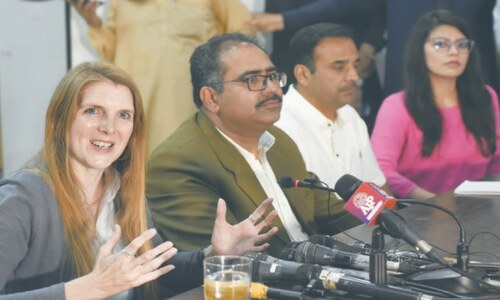ISLAMABAD: The Free and Fair Election Network (Fafen) has called upon political parties to immediately initiate a comprehensive dialogue on addressing weaknesses in the existing legal framework for elections in the country.
“Unless the political parties set aside their differences for upholding democracy and protecting its integrity through free, fair and transparent elections, the country will continue to be embroiled in political instability having adverse effects on the already-fragile economy,” it said in a statement on Friday.
It noted that with only seven months left of the incumbent National Assembly, it was an opportune time for the political parties to make necessary changes to the electoral framework that can guarantee free, fair, transparent and inclusive elections.
For the upcoming general elections to bring stability, it proposed the formation of a cross-chamber multi-party parliamentary committee, similar to the one set up in 2014 with representation from the Senate and the National Assembly. Despite political fragmentation at the time, the 2014 parliamentary committee on electoral reforms was successful in developing a consensus on the reforms’ agenda, allowing the enactment of a unified election law.
The Elections Act 2017 provided for relatively more autonomy to the Election Commission of Pakistan (ECP) and introduced reforms in election processes. The committee, however, stopped short of addressing critical systemic issues such as improving representativeness, curbing the role of money in politics and the use of technology in elections.
The election system in Pakistan is facing emerging challenges such as the increasing role of social media that has opened up new avenues for the use of money in elections in the form of third-party financing of political campaigns including from sources prohibited by the law.
Similarly, the parties need to decide on the modus operandi for facilitating voting by overseas Pakistanis, either through postal ballot or through the reservation of special seats for Pakistanis living abroad.
Equally important will be legal measures to bind the ECP to scrutinise election results before the notification of the winners as a prerequisite for the integrity of the election outcome as well as to minimise the post-election litigation.
Initiating concrete measures for electoral reforms will be in consonance with the undertaking by the leaders of the incumbent coalition government in the Supreme Court during the hearing on the suo motu notice against the National Assembly deputy speaker’s ruling on the resolution of no-confidence against the former prime minister and the subsequent dissolution of the assembly.
On April 7, 2022, the leadership of Pakistan Muslim League (PML-N) and the Pakistan People’s Party (PPP) committed before the apex court that they would introduce electoral reforms ahead of the general elections.
However, the government has not introduced any tangible reform package in parliament except the legislation restoring original provisions of the Elections Act 2017 regarding overseas voting (Section 94) and electronic voting machines (Section 103).
Fafen said such a political dialogue will help reduce the political tensions in the country and will ensure the conduct of peaceful elections. Considering the elections are constitutionally due by October 11, 2023, unless a political understanding otherwise, it urged political parties to agree on a minimum, common and absolutely-must agenda for reforms, which may include the following crucial areas that need urgent attention in addition to the Elections (Amendment) Bill 2020 subject to recommendations by the Senate Standing Committee on Parliamentary Affairs.
Political parties need to build consensus on strengthening the provisions of the Elections Act 2017 concerning the use of money in elections.
The existing checks on the election expenses are of little or no significance in the absence of (i) a clear definition of the election expense specifying the duration during which an expense would be deemed as an election expense, (ii) consideration of third-party financing in form of donations, material support as expenses incurred by the candidate without any condition, (iii) mandatory scrutiny of candidates’ election expenses by the ECP, (iv) any punitive consequences for falsifying or withholding information in expense returns, (v) a limit for the political parties’ financing of election campaigns, and (vi) legal mechanisms to regulate election expenses incurred directly by the candidates or the political parties or their supporters using online means and social media.
The proposed committee should consider strengthening the relevant sections of the Elections Act especially Sections 136 and 211, which concern the ECP’s action relating to election expenses by candidates and campaign finance by political parties.
Fafen also urged the political parties to create provisions in the Elections Act for greater control of the ECP in managing the election results that are overseen by officials seconded by the executive and judiciary, right from polling station to the consolidation stages.
Published in Dawn, January 28th, 2023














































Dear visitor, the comments section is undergoing an overhaul and will return soon.